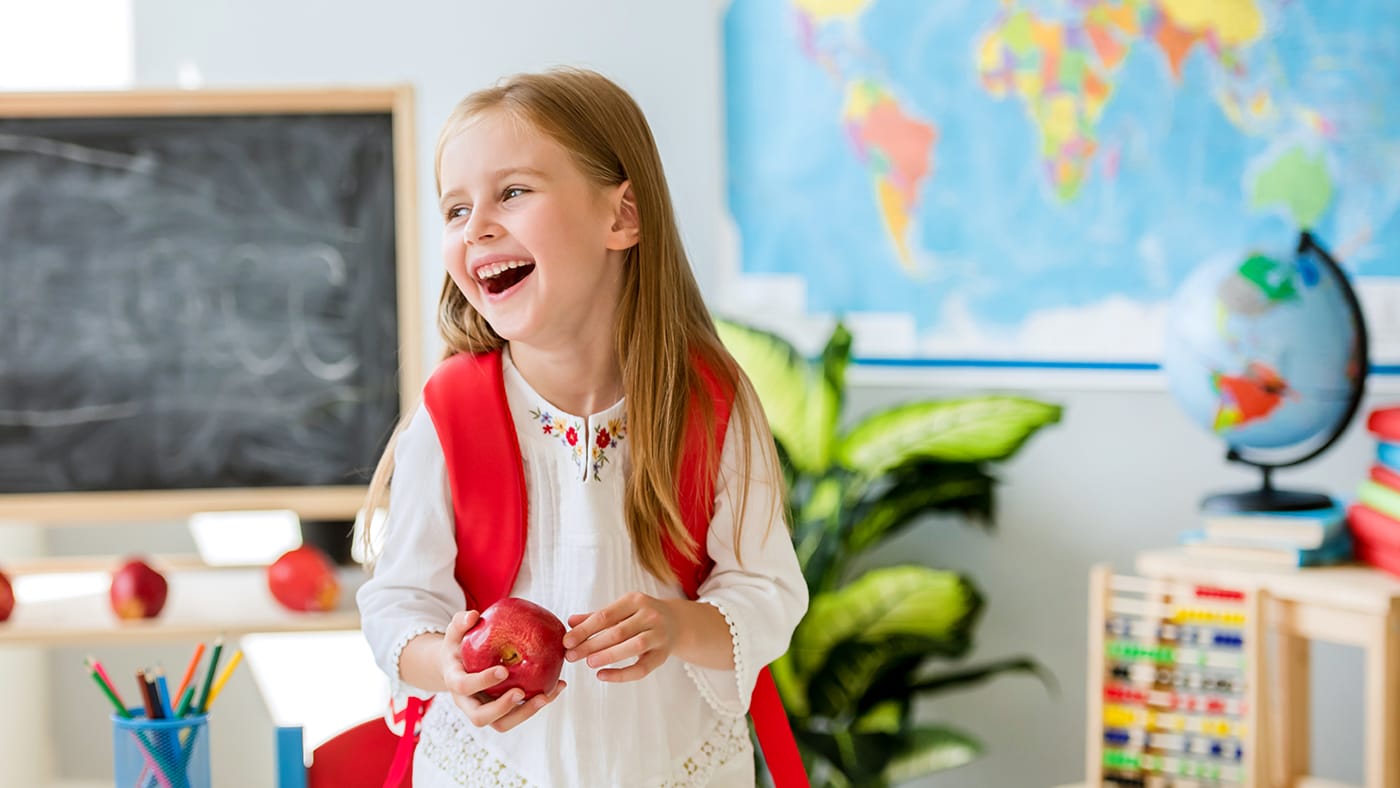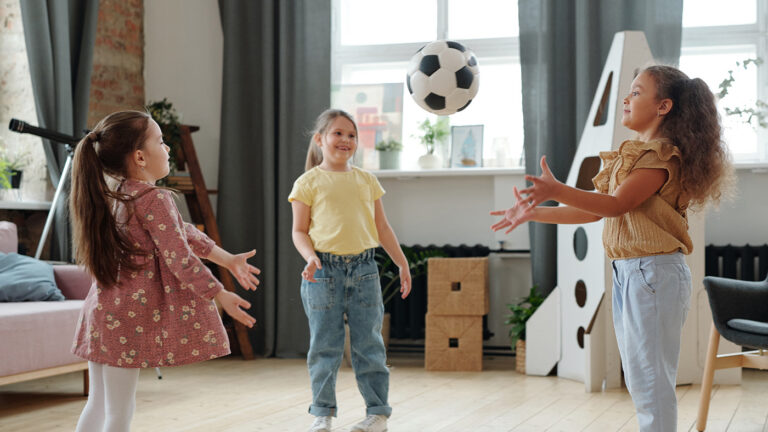Five years go by faster than you think, and then it’s time for your child to go out into the wide world on their first day of kindergarten. On top of teaching your baby to walk and talk, feed themselves, and go to the bathroom, you’re also responsible for preparing them to enter kindergarten. Many parents wonder what knowledge and skills they should impart to their children before sending them off to class.
Schools are designed to give your child the foundational knowledge they’ll need to do whatever they want when they grow up. Of course, they can’t enter school with a completely blank slate. Your child needs to be able to follow rules, stay in class, and learn the information presented. They also need the social skills to interact with teachers and peers. It’s up to you to set your child up with the skills they need to be ready for their first day of school.
What does my child need to know before their first day of kindergarten?
Schools are designed to focus on academic success, and kindergarten is the kickstart to that. Your child’s teacher will help them get up to speed, no matter what they know or don’t know when they head to school that first day. That being said, exploring a few basic educational skills could give your child a head start and make those first days of class more comfortable.
Recognize the Alphabet
Work with your child to identify the letters of the alphabet and the sounds they make.
Numbers to Ten
Counting to ten provides a foundation for the rest of math. Larger number sets are built on the same digits, and everything from addition to algebra is based on an understanding of one through ten.
Sight Words
Simple, high-frequency words like “the,” “you,” and “of” are those that kids can learn to recognize on sight. Because those words make up a large percentage of children’s reading material, learning to recognize them on sight can help kids learn to read more easily.
Hand Coordination
Knowing how to correctly and comfortably hold a pencil, crayon, or scissors is an important skill for success at school.
Of course, a positive attitude and willingness to learn are more important than memorizing sight words or learning to count to ten. Getting to class, staying in class, listening closely, and following directions are more important than hitting an academic checklist.
Active Listening
Can your child listen to an adult speaking without interrupting or getting distracted?
Follow Directions
Can your child listen to a simple set of instructions and follow them in the correct sequence?
Bathroom Time
Does your child recognize when they need to go to the bathroom, and can they do the job on their own from start to finish?
Ease of Separation
Can your child separate from you without an intense, adverse, emotional reaction?
10 Tips for Getting Your Child Ready for The First Day of School
1. Read Together
Read with your child daily and talk together about what you read. Pose questions to your child and discuss any questions they have. Try to relate the material to real-world experiences whenever possible. Pairing a book with a trip to the museum or a walk in the park to help your child connect and absorb the material.
2. Write Together
Practice writing the alphabet, drawing shapes, or spelling your child’s name together. Write thank-you notes for birthday gifts or notes to grandparents with simple words and pictures. Keep paper, pencils, or crayons on hand so your child can write or draw independently. Even scribbling with crayons can help with motor development and pencil grip.
3. Try Something New
Get out of the house. Visit with a variety of family members and friends. Visit the zoo, the aquarium, parks, shopping centers, and other kid-friendly locations. Provide opportunities for your child to experience new places and play with other children.
These experiences will help them practice social skills and prepare for interacting with unfamiliar people and environments. They’ll learn crucial skills for social and educational success, like taking turns, playing well with others, and apologizing when they’ve made a mistake.
4. Promote Independence
Help your child explore their own independence. Give them tasks and chores to do around the house. Let them pick out their own clothes or make their own snacks. Let them push boundaries a little so they know where those boundaries are and feel more comfortable doing things without parental supervision.
Can your child open a juice carton or a pudding cup? Can they zip and unzip a jacket or fasten and unfasten their shoes? Pay attention to the things you typically do for your child and let them try to do it themselves or ask for help when they need it so they can do it when you aren’t around.
5. Talk and Sing Together
Kids are well known for mispronouncing words. It’s one of their most charming qualities, as long as your child can still be understood. Play word games and sing songs together. Play rhyming games and practice tongue twisters. Anything you can do to get your child talking and practicing tough sounds will help them to communicate more effectively. And you’ll have some fun along the way!
6. Talk About School
Often, the worst part about new things is the unknown anticipation. Once your child starts school, they’ll quickly make friends and settle in, but getting them through the door can be challenging. Talk with your child about what school will be like, including lining up outside to go in, hanging their backpack up, making new friends, and listening to the teacher. Discuss any concerns they might have, and reassure them that you’ll see them after school.
7. Plan a Visit
Drive past the school, or better yet, walk around outside. Getting the lay of the land and scoping out playgrounds or other outdoor equipment can get your child excited about going to school. Plan on going to back-to-school night. You can walk through the classroom, see the office, maybe even the library, and meet your child’s teacher in advance so that the first day isn’t quite so scary.
Planning a visit also gives you an opportunity to let the teacher know about any preferences or challenges your child may have. Your child might even get to meet some of their classmates and make friends before school starts.
8. Get Into the Routine
If your child doesn’t go to preschool or daycare, kindergarten may be the first time they’ll need to be in a certain place at a certain time every day. Help your child establish a routine in advance so they can get used to doing things on a schedule.
Set a bedtime routine that includes going to the bathroom, brushing their teeth, and climbing beneath the covers on time. Then, do the same thing in the morning. Practice getting out of bed, getting dressed, and getting out the door at the same time each morning. Pay attention to how long it takes so you’ll know how much time you’ll need to plan for once school begins.
9. Practice Separation
It’s common for young children to have strong attachments to their parents or caregivers. Staying in class all day, or even half a day, away from familiar adults, can be a little scary. Help ease your child into it by practicing separation. Leave your child with a trusted friend or family member for an hour or so, then gradually increase the duration. Over time, your child will become comfortable playing and learning without you looking over their shoulder.
10. Dress Rehearsal
Planning is good, but doing is better. The best way to find roadblocks and plan for them is to go through the motions of going to school. In the days and weeks leading up to the first day of school, run through the entire process with your child.
Get out of bed in the morning, get dressed, and pack a lunch. Drive your child to school or walk them to the bus stop. If separation is difficult, try setting up a goodbye ritual like a high five, wave, or blowing a kiss to mark the transition and send your little one off on a good note.
Sending your child off to kindergarten brings a mix of pride, nerves, and maybe a few tears. Just remember, the love, guidance, and confidence you’ve given them will go with them into the classroom. Before you know it, your little kindergartener will be skipping into school and looking forward to their day. As hard as it is to see them become more independent, the life skills they are gaining make your heart swell with pride.




